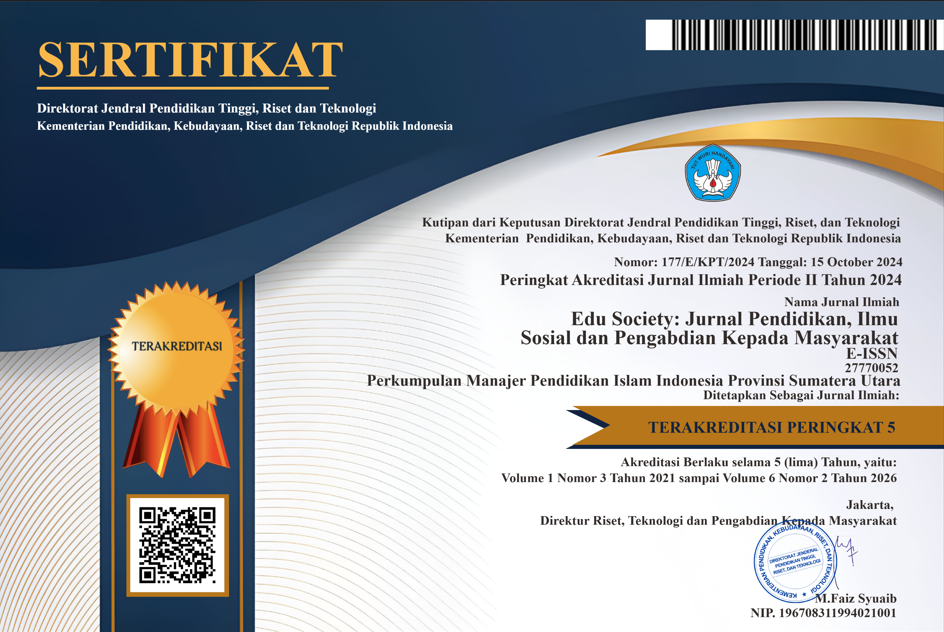Teaching English: A Study of Strategy Preferences among Male and Female
DOI:
https://doi.org/10.56832/edu.v5i1.896Keywords:
English Teaching, Gender, Teaching StrategyAbstract
Various teaching strategies have been applied in English language learning, but there is lack of research in examines how teacher gender influences the preferences of strategies. This lack of knowledge can hinder the development of teaching methods that responsive to individual teacher characteristics. This study identifies differences in teaching strategies between male and female English teachers focusses on the influence of gender on the preferences of teaching methods in the context of Merdeka Curriculum. This tudy aims to describe the teaching strategy preferences used by each gender and understand how these differences can affect the effectiveness of classroom learning. Using a qualitative approach and convenience sampling method, four English teachers (two male and two female) were selected as sample. The data were collected through teaching strategy checklists, observation checklists, interviews, and anecdotal notes, then analyzed using interactive data analysis. The results showed each teacher has different preferences in teaching strategies influenced by students' needs, material needs, and classroom context. The application of various learning strategies can improve the effectiveness of the teaching and learning process. This research is expected to provide more specific recommendations to support the development of teaching methods with students' needs, thus improving the quality of learning.References
Al Fajri, T. A., & Andarwulan, T. (2023). Implementation of The Merdeka Curriculum in Indonesia: Challenges and Opportunities. Jurnal of Educational Innovation, 10(2).
Alghamdi, A. K. H., & Al-Ghamdi, N. A. (2021). Elementary teachers’ thoughts about distance education and learning 21st-century skills during covid pandemic. International Journal of Learning, Teaching and Educational Research, 20(3), 33–50. https://doi.org/10.26803/ijlter.20.3.3
Amurwani, P. P. (2021). Konstruksi Bahasa Guru Perempuan Dan Laki-Laki Pada Kegiatan Awal Pembelajaran. TOTOBUANG (Jurnal Ilmiah Kebahasaan Dan Kesastraan), 9(1), 15–26. https://doi.org/10.26499/ttbng.v9i1.240
Arif Rachman, L. (2023). English Language Teaching Based on Merdeka Curriculum in Public Senior High School Level in Bandung: Based on The Situational Analysis. PROJECT (Professional Journal of English Education), 6(6). https://journal.ikipsiliwangi.ac.id/index.php/project/article/view/20704
Arini, R., Cahya Ningrum, R., & Hidayat, S. (2024). Kurikulum Merdeka Dalam Perspektif Filsafat Pendidikan Pragmatisme. Jurnal Asy-Syukriyyah, 15(1), 14–26. https://doi.org/10.21927/literasi.2024.15(1).14-26
Artini, L. P. (2017). Rich Language Learning Environment and Young Learners’ Literacy Skills in English. Lingua Cultura, 11(1), 19. https://doi.org/10.21512/lc.v11i1.1587
Chudgar, A., & Sankar, V. (2008). The relationship between teacher gender and student achievement: Evidence from five Indian states. Compare: A Journal of Comparative and International Education, 38(5), 627–642. https://doi.org/10.1080/03057920802351465
Eckert, Penelope., & McConnell-Ginet, Sally. (2013). Language and Gender (Second Edition). Cambridge University Press. https://doi.org/10.1017/CBO9781139245883
Gillies, R. M., & F. Ashman, A. (2005). Co-operative Learning: The Social and Intellectual Outcomes of Learning in Groups. RoutledgeFalmer.
Hall, S., & Liebenberg, L. (2024). Qualitative Description as an Introductory Method to Qualitative Research for Master’s-Level Students and Research Trainees. In International Journal of Qualitative Methods (Vol. 23). SAGE Publications Inc. https://doi.org/10.1177/16094069241242264
Hunaepi, H., & Suharta, I. G. P. (2024). Transforming Education in Indonesia: The Impact and Challenges of the Merdeka Belajar Curriculum. Path of Science, 10(6), 5026–5039. https://doi.org/10.22178/pos.105-31
Hyde, J. S. (2014). Gender Similarities and Differences. In Annual Review of Psychology (Vol. 65, pp. 373–398). Annual Reviews Inc. https://doi.org/10.1146/annurev-psych-010213-115057
Irsyad, S. F., Syarif, H., & Zainil, Y. (2024). Flexible Approach in English Language Learning Curriculum Design: Optimizing Teaching in Merdeka Curriculum. Eduvest-Journal of Universal Studies, 4(11), 9843–9852. https://doi.org/10.59188/eduvest.v4i11.43675
Mahmud, M. (2010). Language and Gender in English Language Teaching. TEFLIN Journal - A Publication on the Teaching and Learning of English, 21(2). https://doi.org/10.15639/teflinjournal.v21i2/172-185
Martina, & Afifi, N. (2024). Gender DIfferences and Language Learning Strategies of Indonesian Students: A Crtitical Research Review. Klasikal: Journal of Education, Language Teaching and Science, 6(3). https://doi.org/doi.org/10.52208/klasikal.v6i3.1216
Miles, M. B., Huberman, A. M., & Saldana, J. (2014). Qualitative Data Analysis: A Methods Sourcebook (Third Edition).
Muhammad Rafi Zidan, & Zaitun Qamariah. (2023). A Literature Study On The Implementation Of Merdeka Curriculum. Jurnal Riset Rumpun Ilmu Bahasa, 2(2), 153–167. https://doi.org/10.55606/jurribah.v2i2.1576
Muliadi, M. (2022). Penerapan Grammar Translation Method (Gtm) Dalam Meningkatkan Writing Skill (Ws) Dan Self-Development (Sd) Siswa Madrasah Aliyah (Ma) NW Mengkuru. Jurnal Ilmiah Global Education, 3, 97–101. https://doi.org/10.55681/jige.v3i1.178
Mustika, U., & Wardah, W. (2021). AN ANALYSIS OF TEACHER’S STRATEGIES IN TEACHING ENGLISH. Journal of English Education Program, 2(1). https://doi.org/10.26418/jeep.v2i1.43003
Rahma, A. A., Bafadal, U., Ilyas, S. N., Musi, M. A., & Rusmayadi. (2024). STRATEGI GURU DALAM IMPLEMENTASI KURIKULUM MERDEKA UNTUK MENGEMBANGKAN LITERASI ANAK USIA DINI. Jurnal Inovasi Pendidikan Dan Teknologi Informasi (JIPTI), 5(2), 242–254. https://doi.org/10.52060/jipti.v5i2.1929
Risna, R. (2023). Analyzing the efficacy of outcome-based education in Kurikulum Merdeka: A literature-based perspective. Curricula: Journal of Curriculum Development, 2(2), 155–166. https://doi.org/10.17509/curricula.v2i2.59624
Rizki, A. A., & Soviyah, S. (2024). Implementation of English in the Merdeka curriculum at SD Negeri Dlingo. International Undergraduate Conference on English Education, 3(1), 201–206. https://doi.org/10.12928/iucee2024.v3i1.14744
Savitri, A. S., Sallamah, D., Permatasari, N. A., & Prihantini, P. (2022). PERAN STRATEGI PEMBELAJARAN TERHADAP MOTIVASI BELAJAR SISWA. Jurnal Pendidikan Sosiologi Dan Humaniora, 13(2), 505. https://doi.org/10.26418/j-psh.v13i2.54825
Sherly, Dharma, E., & Sihombing, H. B. (2020). Merdeka Belajar: KajianLiteratur.
Sunderland, J. (2000). Issues of language and gender in second and foreign language education. In Language Teaching (Vol. 33, Issue 4, pp. 203–223). https://doi.org/10.1017/S0261444800015688
Yen, P. H., Thuy, P. T., Tra, N. H., Thu, H. T. A., Thi, N. A., & Thao, L. T. (2024). Unveiling the Veil: Gender Differences in Satisfaction among K12 Teachers in the Teacher Activity Groups Initiative. International Journal of Instruction, 17(3), 79–98. https://doi.org/10.29333/iji.2024.1735a
Yuliani, W. (2018). Metode Penelitian Deskriptif Kualitatif dalam Perspektif Bimbingan dan Konseling. QUANTA: Jurnal Kajian Bimbingan Dan Konseling Dalam Pendidikan, 2(2). https://doi.org/10.22460/q.v2i1p21-30.642
Zannah, R. (2024). The Differences between Male and Female Teachers in Choosing Teaching Method for English Language Learning.









